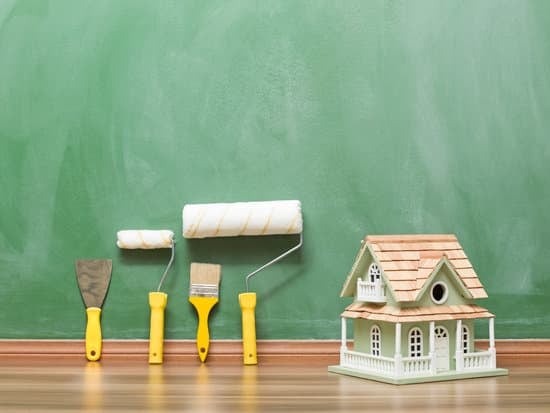Does a home improvement loan count as home equity? When it comes to financing home renovations or upgrades, understanding the relationship between home equity and home improvement loans is crucial. In this article, we will delve into the world of home equity and home improvement loans to help you make informed decisions about funding your next property enhancement project.
Home equity is a valuable asset that many homeowners possess, but it can be confusing to understand how it works and how it relates to home improvement loans. We will start by explaining what home equity is, how it is calculated, and how it can be utilized as a financial resource for making improvements to your property.
Next, we will take a closer look at the different types of home improvement loans available, as well as their benefits and drawbacks. By understanding these options, you will be better prepared to assess whether a home improvement loan is an appropriate choice for leveraging your home equity for renovation purposes.
Throughout this article, we will explore the nuances of using a home improvement loan as a form of tapping into your home equity. By the end, you will have gained insights into the pros and cons of this approach and alternative methods for funding your property upgrades. Stay tuned to learn valuable tips for maximizing the benefits of both home improvement loans and home equity.
Explaining Home Equity
Home equity is an important concept for homeowners to understand, as it can have a significant impact on their financial well-being. Essentially, home equity is the value of a homeowner’s interest in their home. This value is determined by taking the current market value of the home and subtracting any outstanding mortgage balance. The remaining amount represents the homeowner’s equity in the property.
There are two ways that homeowners can build equity in their homes. The first way is through the gradual reduction of their mortgage balance as they make monthly payments. The second way is through an increase in the market value of the property. As the property value increases, so does the homeowner’s equity.
- Home equity is often considered a valuable asset, as it can be used as collateral for a loan or line of credit.
- Homeowners can also access their home equity by selling their property at a profit or by refinancing their mortgage.
- It’s important for homeowners to monitor their home equity over time, as it can serve as a source of wealth that can be tapped into when needed.
Overall, understanding home equity and how it works is essential for homeowners who are considering leveraging this asset for various financial needs. Whether it’s for debt consolidation, home improvements, or other major expenses, being knowledgeable about home equity can help homeowners make informed decisions about managing and utilizing this valuable asset.
Understanding Home Improvement Loans
Home improvement loans are a popular way for homeowners to finance renovations, repairs, or additions to their homes. These loans can come in various forms, including personal loans, home equity loans, and home equity lines of credit (HELOCs). Personal loans are unsecured loans that do not require any collateral, while home equity loans and HELOCs use your home as collateral.
One of the key benefits of a home improvement loan is that it can increase the value of your property. By making strategic renovations or improvements, you may be able to significantly raise the market value of your home. Additionally, these loans often come with lower interest rates compared to other types of financing, making them an attractive option for homeowners looking to invest in their property.
Another advantage of home improvement loans is that they provide a structured payment plan, allowing you to budget for the costs of your renovation over time. This can be especially beneficial if you are working with a specific budget or timeline for your home improvement project. Some lenders also offer flexible repayment terms and options, giving you the freedom to choose a loan that aligns with your financial situation.
| Types | Benefits |
|---|---|
| Personal Loans | Unsecured, no collateral required |
| Home Equity Loans/HELOCs | Lower interest rates, potential tax benefits |
Does a Home Improvement Loan Count as Home Equity? Exploring the Relationship
When homeowners consider making improvements to their homes, they often look to home equity as a way to finance these projects. Home equity refers to the value of the homeowner’s interest in their home, and it can be used as collateral for loans.
One common question that arises is whether a home improvement loan counts as home equity. In this section, we will explore the relationship between home improvement loans and home equity to provide a better understanding for homeowners.
Understanding Home Equity Loans and Lines of Credit
Home equity loans and lines of credit are options that allow homeowners to borrow against the value of their homes. With a home equity loan, the homeowner receives a lump sum of money and makes regular payments with a fixed interest rate. A home equity line of credit (HELOC), on the other hand, acts more like a credit card where the homeowner can borrow up to a certain limit and makes payments based on the amount borrowed.
The Relationship Between Home Improvement Loans and Home Equity
While a home improvement loan does not directly count as home equity, it can still impact your overall equity in your home. By using a home improvement loan to make upgrades or renovations, you could potentially increase the value of your property, thereby increasing your home equity.
However, it’s important to note that simply taking out a loan does not automatically increase your home’s value – it is how you use those funds that determines their impact on your overall equity.
Weighing Your Options
When considering whether to use a home improvement loan for enhancing your home’s value and ultimately its equity, it’s crucial to weigh all available options. Homeowners should consider factors such as interest rates, repayment terms, potential increase in property value, and overall financial impact before deciding on how to leverage their existing or potential future home equity through different financing options.
The Pros and Cons of Using a Home Improvement Loan for Home Equity
Pros
Using a home improvement loan to increase your home’s equity can have several advantages. One of the primary benefits is the potential to increase the value of your property.
By investing in improvements such as kitchen or bathroom upgrades, adding a deck or patio, or making energy-efficient changes, you can potentially raise the market value of your home. This increased value can result in greater equity, which may be beneficial if you are looking to sell your home in the future.
Another advantage of using a home improvement loan for home equity is the ability to enjoy your living space more fully. Making improvements that enhance both the functionality and aesthetic appeal of your home can improve your quality of life. Whether it’s creating a more comfortable environment for yourself or making updates that appeal to potential buyers, utilizing a home improvement loan for this purpose can be rewarding.
Cons
On the flip side, there are also some drawbacks to using a home improvement loan for home equity. One potential concern is the risk involved with taking on additional debt. If you already have an existing mortgage and then add a home improvement loan on top of that, you’ll be increasing your overall debt load. This could lead to financial strain if you’re not able to manage the combined payments effectively.
Additionally, it’s important to consider whether the improvements you make will actually result in an increase in home value. While some renovations can boost your property’s worth, others may not provide as high of a return on investment. If you invest in costly upgrades that don’t significantly add value to your home, you may end up spending more than you’ll recoup when it comes time to sell.
Overall, using a home improvement loan for home equity has its benefits and drawbacks. It’s essential to carefully weigh these factors and consider your individual circumstances before making this financial decision.
Alternatives to Using a Home Improvement Loan for Home Equity
While a home improvement loan is one way to access the equity in your home, there are other alternatives that homeowners can consider. One option is a home equity line of credit (HELOC), which allows you to borrow against the equity in your home as needed, similar to a credit card. Another alternative is a cash-out refinance, where you can refinance your mortgage for more than you currently owe and receive the difference in cash.
A HELOC can be a flexible and convenient way to access your home equity, especially if you have ongoing home improvement projects with varying costs. On the other hand, a cash-out refinance may be beneficial if interest rates have decreased since you initially took out your mortgage, allowing you to get a lower rate while accessing your home’s equity.
It’s important to compare these alternatives based on factors such as interest rates, fees, repayment terms, and potential tax implications. Consulting with a financial advisor or mortgage professional can help you weigh the pros and cons of each option and determine which alternative is best suited for your specific financial situation and goals.
| Alternative | Description |
|---|---|
| Home Equity Line of Credit (HELOC) | A revolving line of credit that allows homeowners to borrow against their home equity as needed. |
| Cash-Out Refinance | Refinancing the mortgage for more than what is currently owed in order to receive the difference in cash. |
Tips for Maximizing the Benefits of Home Improvement Loans and Home Equity
When considering home improvement loans and home equity, it’s essential to maximize the benefits of both options. Here are some tips for getting the most out of your home improvement loan and home equity:
- Use a Home Improvement Loan Strategically: When using a home improvement loan, it’s crucial to strategically plan the renovations or upgrades you want to make. Prioritize projects that will increase the value of your home and provide a high return on investment. This could include kitchen or bathroom remodels, adding a bedroom, or improving energy efficiency.
- Take Advantage of Home Equity: If you have built up significant equity in your home, consider leveraging it for larger renovation projects. Since home equity loans typically offer lower interest rates than other forms of credit, they can be a cost-effective way to finance major improvements.
- Compare Lenders and Loan Terms: When seeking a home improvement loan, take the time to compare different lenders and loan terms. Look for competitive interest rates, favorable repayment terms, and minimal fees. Additionally, consider whether a secured or unsecured loan is the best option for your specific needs.
By implementing these tips, homeowners can make informed decisions about utilizing both their home improvement loans and home equity. Whether it’s upgrading a kitchen, adding an extra room, or making energy-efficient improvements, being strategic and leveraging available resources can help maximize the benefits of these financing options. Ultimately, careful planning and wise use of both home improvement loans and home equity can result in improved living spaces and increased property value.
Conclusion
In conclusion, it’s important for homeowners to understand the relationship between home improvement loans and home equity in order to make informed decisions about their finances. While a home improvement loan does not directly count as home equity, it can potentially increase the value of your property, which in turn can build equity over time.
It’s crucial to carefully consider the pros and cons of using a home improvement loan for this purpose, and to explore alternative options as well.
When considering whether to use a home improvement loan for building home equity, homeowners should weigh the potential benefits against the risks involved. While investing in renovations can enhance the value of your property, there is also the risk of overleveraging and becoming financially burdened. Alternatives such as a cash-out refinance or a home equity line of credit should be explored and compared to determine the best course of action.
Ultimately, making informed decisions about home improvement loans and home equity requires thorough research and consideration of individual financial circumstances. By understanding the potential impact on your property’s value, weighing the advantages and disadvantages, and exploring alternative options, homeowners can make strategic choices that will ultimately benefit their financial well-being. It is essential to seek professional advice from financial experts or mortgage lenders when making these important decisions about leveraging your home for improvements.
Frequently Asked Questions
What Is the Cheapest Way to Get Equity Out of Your House?
The cheapest way to get equity out of your house is through a home equity loan or line of credit. These options typically have lower interest rates compared to personal loans or credit cards, making them a more affordable choice for accessing the equity in your home.
Another cost-effective option is a cash-out refinance, where you replace your existing mortgage with a new one that has a higher principal amount, allowing you to receive the difference in cash.
Are Home Improvement Loans a Good Idea?
Home improvement loans can be a good idea if you have a solid plan for how the funds will be used and if the improvements have the potential to increase the value of your home. This type of loan can provide the necessary funds for projects like renovations, repairs, or upgrades without sacrificing your savings or retirement funds.
Before taking out a home improvement loan, it’s essential to consider the interest rates, repayment terms, and overall cost to ensure it aligns with your financial goals.
How Do Home Improvements Affect Equity?
Home improvements can positively affect equity by increasing the value of your property. Quality upgrades and renovations can make your home more attractive to potential buyers, resulting in a higher market value.
Additionally, improving the functionality and aesthetics of your home can also contribute to its overall desirability and appeal. However, it’s important to keep in mind that not all improvements guarantee an increase in equity, so it’s essential to carefully consider which projects are most likely to have a positive impact on your home’s value before investing in them.

I’m thrilled to have you here as a part of the Remodeling Top community. This is where my journey as an architect and remodeling enthusiast intersects with your passion for transforming houses into dream homes.





